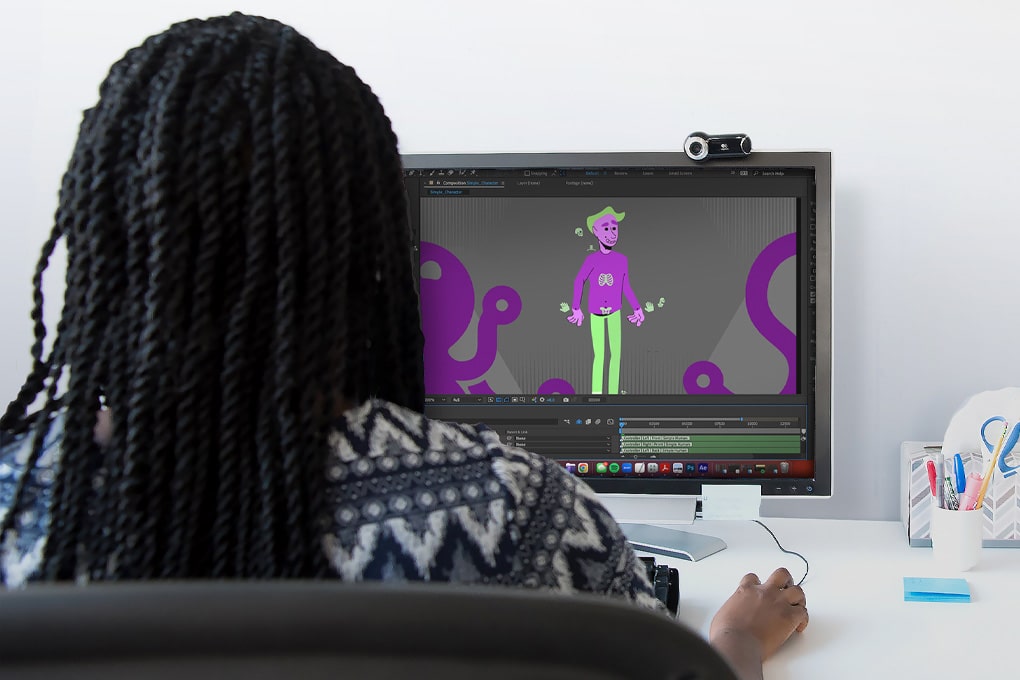DIG 212: After Effects II
Advanced Animation and Motion Graphics
It’s time to level up your After Effects skills. In this course, you’ll build on your basic knowledge of AE and explore how to employ more advanced animation techniques and visual effects. Guided by an industry pro, you'll learn how to use motion paths and value and speed graphs to make objects move in believable ways. You will discover how to apply classic animation principles to mirror real-world physics and how to use rigging to set up 2D characters for animation. You will learn about ways to refine your animations and make them interactive. Finally, you'll explore best practice strategies for using Motion Graphics Templates (MOGRTS) and coding to optimize your workflow.

About This Course
Project-Based Learning
Animation projects simulate real-world physics, such as driving a car from an aerial view, path motion, a Rube Goldberg sequence, and rigging a character animation for a walk cycle. In the final project, students pursue an area of interest.
What Skills Will I Develop?
Students in this course can expect to learn to:
- Employ different key types in After Effects to control timing and spacing and enhance the overall feel of an animation.
- Discover how to apply a variety of value and speed graphs for greater control over animated properties.
- Simulate real-world physics in animation using principles such as arcs, squash, stretch, bounce, impact, oscillation, and pendulums.
- Explore narrative and interactive animation applications and apply them in your work.
- Develop a Rube Goldberg Machine animation based on overlap, follow-through, and secondary animation principles.
- Incorporate principles of character animation to convey emotion and personality.
- Create a walk cycle animation using rigging, anchor points, and parenting techniques.
- Utilize code in After Effects to automate repetitive animation tasks.
- Discover how Motion Graphics Templates (MOGRTS) allow editors to adapt and customize templates for their specific needs.
- Install and utilize After Effects plug-ins to enhance workflow and expand the software’s capabilities.
What Software and Supplies Do I Need?
- Computer with Internet connection (broadband recommended).
- Computer that meets the Adobe After Effects recommended system requirements.
- Adobe After Effects.
- Adobe Photoshop or Illustrator.
- Basic experience in the above software and digital media skills.
Course Instructor(s)
The course is taught by the following instructor(s):
 Sara Wade
Sara Wade
Sara Wade is a motion designer, animator, illustrator and educator who has worked for clients across the globe for over two decades. She has developed curriculum, created courses and taught for universities and schools for over 15 years.
View all Faculty
Course Outline
Animating Time
We will kick off this course by examining how to apply the fundamental animation principles of timing and space and their effect on an animation's look and overall feel. You’ll review the types of keyframes used in After Effects and discover how to access a variety of value-easing curves in the graph editor for greater precision and control over your animations.
Mastering Motion
Get ready to bring your animations to life in exciting new ways. We will explore the transformative world of animation arcs, discovering how they add fluidity and realism to your creations. You'll work with speed graph manipulation to unlock nuanced techniques for controlling motion while examining how squash and stretch principles can breathe life into your animations.
Animating Energy & Narrative Animation
This week, we explore why concepts based in physics, such as bounce and impact, are essential for crafting lifelike animations in After Effects. We will examine how a pendulum can oscillate between two values to create convincing motion. We will connect these scientific principles to the world of Western animation, looking at the ways in which animators rely on physics-based concepts to create scenes and stories.
Refined Motion & Interactive Animation
They say that one thing leads to another. In this lecture we will explore how natural, dynamic movement is created using overlap and follow-through techniques. You will discover how secondary animation heightens the realism in your environments, making each scene more distinctive. We will take a look at the fascinating world of interactive animation, discussing the exciting possibilities for an animator using After Effects.
Character Animation Basics
This week, we embark on an invigorating journey into the principles of character animation, exploring the key elements that breathe life and relatability into characters. This all begins with the intricacies of body mechanics and acting, where real-world physics and anatomy shape a character's movements by adding authenticity to their actions. We will discuss how to rig a 2D character and create a walk cycle animation, the sequence that creates the illusion of a character walking seamlessly in a perpetual loop.
Expressions & Workflow
To prepare you to tackle more complex projects, our final lecture will focus on how to use expressions in After Effects, unveiling the power of code automation to streamline and simplify repetitive tasks and revolutionize your workflow. We will dive into the use Motion Graphics Templates or MOGRTS, productivity tools that can elevate your efficiency and optimize your process. Finally, we will discuss some invaluable workflow enhancements, exploring best practices and plug-ins to boost your animation process, taking it to new heights.
Frequently Asked Questions (FAQ)
How Do The Courses Work?
Our courses are project-based and instructor-led. In each course you’ll complete a series of lectures, projects, discussions, and critiques designed to stretch your creative skills. Weekly assignment deadlines keep you on track, and with no set-logins or Zoom meetings, you can build your studies around your schedule.
Who Are The Instructors?
Our courses are developed and taught by our industry-leading faculty of creative professionals. This means that you’ll learn in-demand skills, get feedback on your work, and build a portfolio of creative work. View our Student Gallery for featured student projects.
When Can I Start?
Classes start January, April, and August, and this course is completed in a 15-week term. College credit from this course can be applied to a range of Degree and Certificate programs at Sessions College. You can enroll in this course on an individual basis or as part of a program.
Explore our Programs: Bachelor's Degree | Associate Degree | Undergraduate Certificate
How Do I Register?
To register for a program, complete our program application. To register for this course on an individual basis, please contact our admissions team at admissions@sessions.edu. An Admissions Advisor will contact you to setup your enrollment.
| Course Tuition and Fees | |
|---|---|
| Tuition | $300/credit |
| Registration Fee* | $200 |
| Total Course Price | $1100 |
Registration fees are nonrefundable after 5 days from enrollment.
Is Sessions College Accredited?
Yes. Since 2001, Sessions College has been accredited by the Distance Education Accrediting Commission (DEAC). The Distance Education Accrediting Commission is listed by the U.S. Department of Education as a recognized accrediting agency and is recognized by the Council for Higher Education Accreditation (CHEA).
RELATED PROGRAMS AT SESSIONS COLLEGE:





















